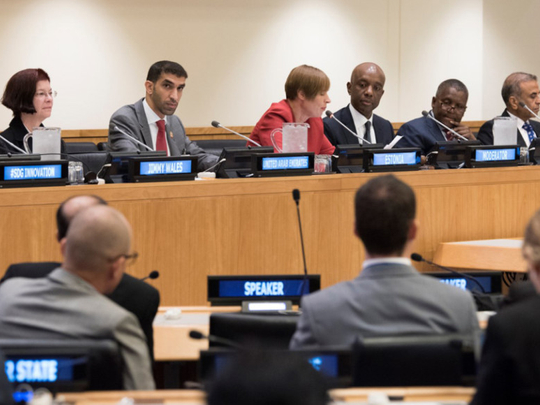
New York City: A new road map proposed by the UAE to help its businesses embrace carbon emission reductions as part of the Paris Agreement was announced by Thani Ahmad Al Zeyoudi, Minister of Climate Change and Environment, at the 72nd UN General Assembly in New York on Monday.
Al Zeyoudi attended the Founders’ Group of the Climate Action Network and noted that national governments must work together to deliver on the goals of the Paris Agreement to reduce the rise of carbon emission in the decades ahead to less than two degree Celsius to fight global warming.
The minister is part of the UAE delegation at UNGA 72 which includes 15 executives representing diverse businesses, such as Majid Al Futtaim Holding, known for launching the world’s first Net Positive sustainability strategy in April 2017 with the aim of achieving a net positive carbon footprint by 2040.
He said the UAE is working on its own clean energy goals with an ambitious clean-energy target of 27 per cent by 2021 and 50 per cent by 2050 and said businesses in the UAE are working to adopt new measures to slash emissions as part of the UAE’s Nationally Determined Contributions (NDCs) to the Paris Agreement.
Al Zeyoudi announced the UAE’s intention to develop the region’s first NDC Investment Roadmap that will outline specific directions and entry points for businesses to help implement the country’s NDCs.
Under the theme ‘Focusing on People: Striving for Peace and a Decent Life for All on a Sustainable Planet’, a weeklong General Debate session at the UN is examining eight topics within three groups — education, environmental conventions and social development.
Al Zeyoudi said, “NDCs could boost the number of jobs created as a result of climate action, increase the overall impact on national GDP, and introduce mechanisms to incentivise investment in low-carbon projects and technologies. They could also enhance existing partnerships and encourage the formation of new ones, thereby unlocking new capital.
“Currently, most of our NDCs focus on three elements: mitigation, adaptation and capacity-building. Through promoting the economic benefits of NDCs and making them relevant to investors and the wider public, we can make the business case for climate action, create a powerful tool to drive investment and bring in economic returns as well.”
Al Zeyoudi said the UAE has completed its first National Climate Change Plan that includes engaging businesses and other non-government entities in climate and environment policy-making as well as fostering innovation and technological advancements among its objectives.












